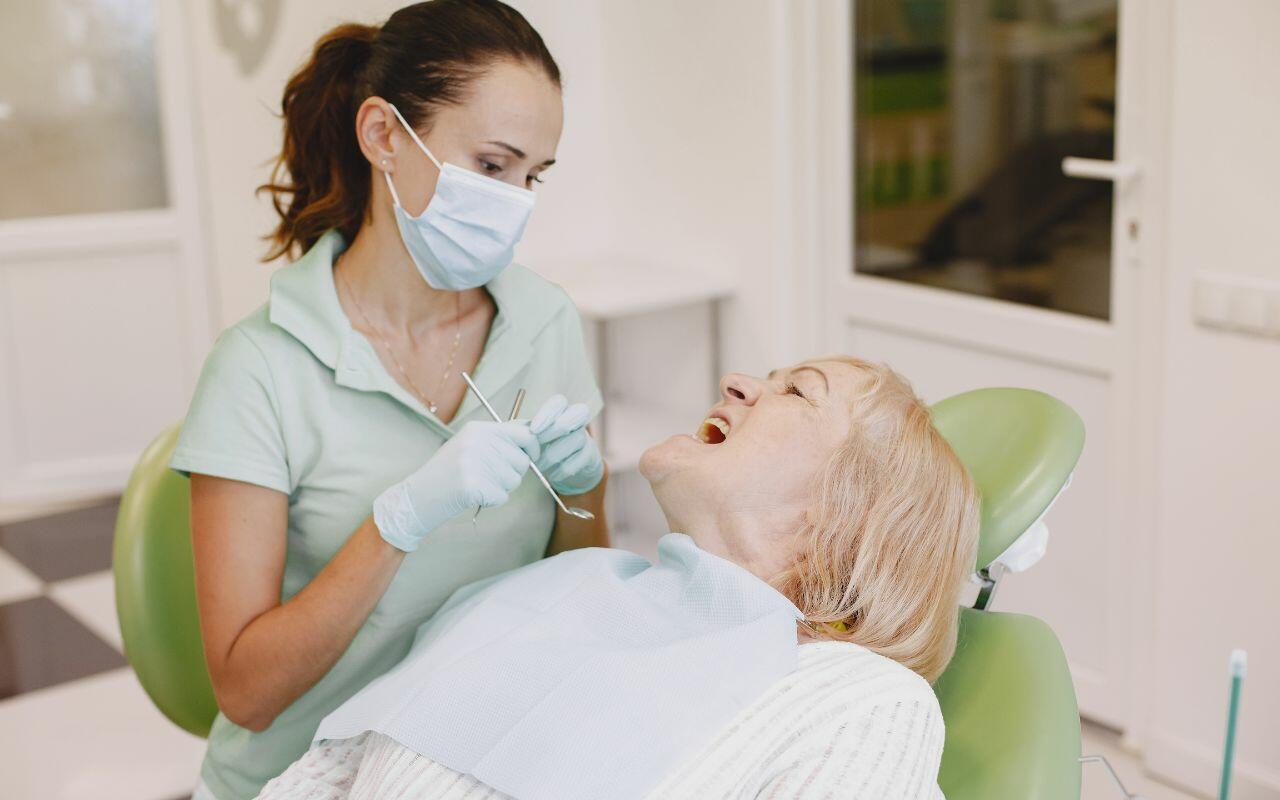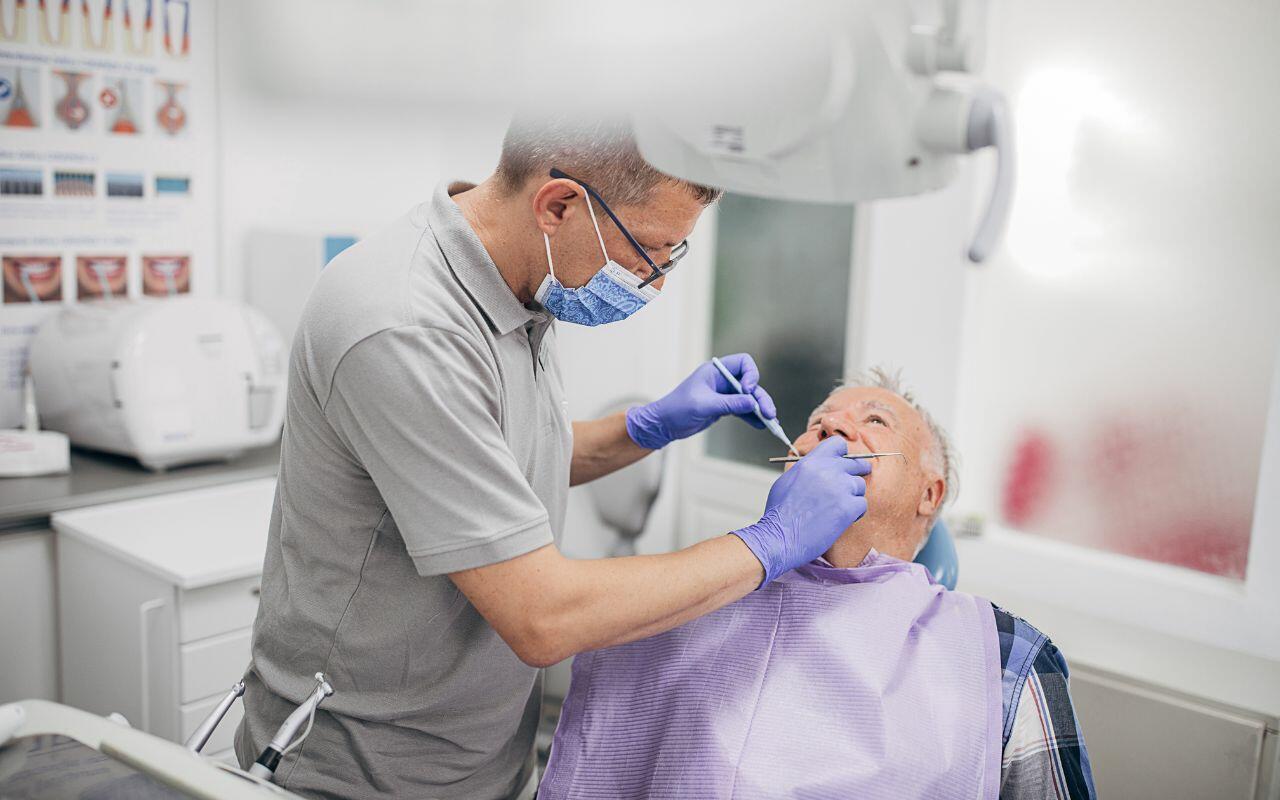Poor oral health is connected to an increased risk for heart disease. However, emerging research has also shown that oral health plays a role in dementia. Studies suggest poor oral health such as gingivitis, dental caries, and tooth loss, can increase the risk of developing cognitive impairment and dementia.
Here we look at the connection between dementia and oral health to help you understand the risks involved when you don’t stick to a strong oral health regime. We also explore the impact poor oral hygiene can have on your loved ones suffering from dementia.
Oral Health Challenges With Dementia Patients

It is not surprising patients with dementia have difficulty maintaining proper oral care because of memory and impaired cognitive function. Poor finger dexterity in these patients also makes it more difficult to manage things such as floss or holding and using a toothbrush. Because of this, it is important to help ensure family members suffering from dementia receive proper dental care.
It can be difficult to try to help patients with dementia perform basic grooming and oral care tasks, as it is not uncommon for them to become aggressive or agitated when help is offered. As a result, your dentist should be involved in their care, with an approach to dental treatment that is both professional-oriented and communication-oriented. Your dentist can identify risks and help your loved one maintain overall health by including oral health care as part of their treatment plan.
Dementia And Oral Health Deterioration

With a decline in cognitive abilities, a decrease in taking proper oral hygiene measures is expected. However, there are other behaviours that can increase the risk for gingivitis, cavities, and tooth loss. The biggest contributor is an increase in eating unhealthy snacks or completely disregarding proper diets in exchange for unhealthy meals altogether.
Some dementia patients might also become dependent on food supplements which contribute to tooth decay. As mentioned above, decreasing motor skills also make it difficult for dementia patients to perform daily oral hygiene tasks. As a result, they become frustrated and simply stop brushing their teeth and flossing.
Risks To Oral Health Due To Dementia

Poor oral hygiene for dementia patients increases the risk for the following dental issues:
- Plaque buildup
- Soft tissue issues including gingivitis
- Gum infections that can spread into the bloodstream
- Cavities
- Reduced chewing function that interferes with dietary needs
- Tooth pain and sensitivity that can decrease quality of life
- Tooth loss that contributes to bone loss of the jaw as well as shifting of the remaining teeth
All these issues require dental care and treatment.
Dental Services For Dementia Patients

Good oral health requires regular dental appointments. However, this becomes difficult with dementia patients who might not want to leave their homes. Access to dental services is key to early diagnosis of serious issues that impact not just oral health, but overall health. Gum disease such as periodontitis can increase the risk for the following:
- Heart disease
- Bacterial infection of the gums getting into the bloodstream affecting the heart valves
- Health challenges for those with artificial heart valves
- Coronary artery disease related to tooth loss
- Complications for patients with diabetes
You can help prepare dementia patients for their dental appointments using these tips:
- Try to determine the best time of day for your loved one and schedule appointments at this time
- Discuss the appointment with your loved one often, so they are prepared for the appointment
- Have them use the bathroom before their appointment to avoid accidents
- Book a short appointment to avoid issues with your loved one
Your dentist can also offer advice to make dental appointments easier for your loved ones.
Poor Oral Health Increases Risk For Dementia

What is less expected is the reverse idea in which people with poor oral health actually increase their risk for dementia. Recent studies have shown oral health issues such as tooth loss and occlusal dysfunction also impact brain function which can trigger the onset of dementia. It can also lead to neurodegenerative diseases such as Alzheimer’s. The connection between aging, oral dysfunction, and the development of dementia is concerning. However, maintaining proper oral health care both at home and with your dentist can help avoid oral health issues and reduce the risks that may lead to dementia.
Signs And Symptoms Of Dementia

Dementia impacts cognitive functions affecting how we think, remember and reason. However, it also impacts our behavioural skills which slowly interferes with our ability to communicate, manage our own health and hygiene, and complete the required activities of daily life. Symptoms of dementia include:
- Memory loss
- Poor judgment
- Confusion
- Difficulty communicating – both understanding others and speaking
- Lack of understanding
- Unable to express thoughts
- Difficulty reading and writing
- Wandering
- Getting lost even in familiar places
- Money management issues
- Repeating comments or questions
- Unable to find the right word, or choosing unusual words
- Difficulty completing everyday tasks quickly
- Loss of interest in events or completing daily activities
- Hallucinating
- Delusions
- Paranoia
- Acting impulsively
- Not caring about the feelings of others
- Movement and balance issues
- Aggression
- Lack of interest in personal grooming including oral hygiene
If you or a loved one experiences these symptoms, you should speak to your doctor as soon as possible.
If your loved one suffers from dementia, it is important to set up dental appointments as soon as they are diagnosed. Dentists who work with dementia patients can offer support, oral care products for dementia patients, and recommend a course of action to help ensure they maintain a healthy oral hygiene regime.
If you need professional dental support for a loved one with dementia, call today to schedule an appointment at 905-775-5307 or click here to request an appointment.
